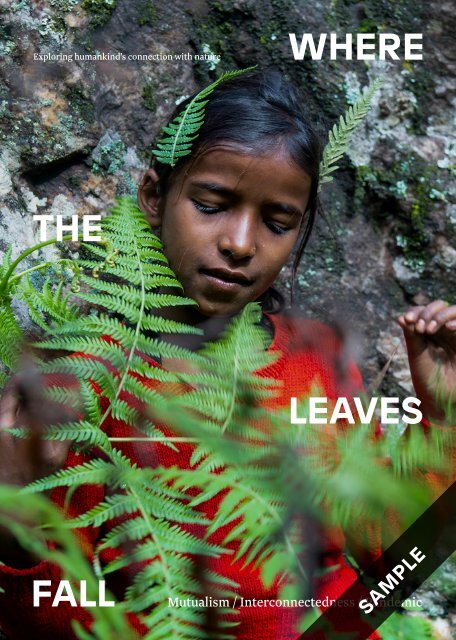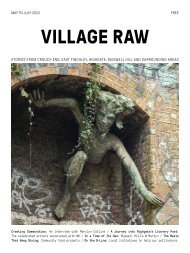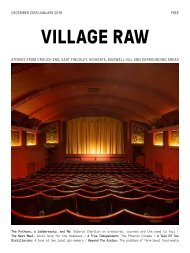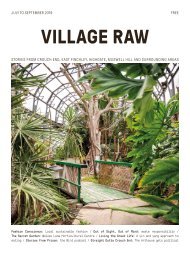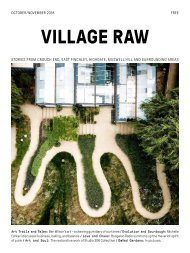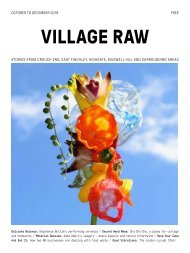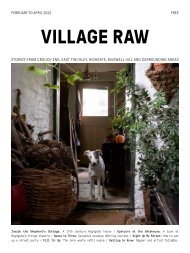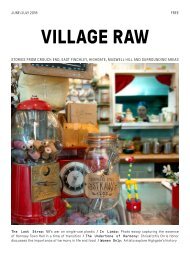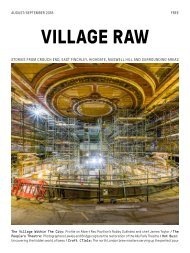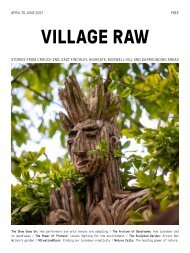Where the Leaves Fall - Resetting Global Food Systems (from issue #4)
As global food systems and supply chains have been disrupted by Covid-19, Francis Mwanza, researcher and writer on African and local foods, and former head of office of the United Nations World Food Programme’s London office, UK, introduces a series of interviews looking at how communities around the world are adapting and finding local food security solutions to a pandemic-struck planet.
As global food systems and supply chains have been disrupted by Covid-19, Francis Mwanza, researcher and writer on African and local foods, and former head of office of the United Nations World Food Programme’s London office, UK, introduces a series of interviews looking at how communities around the world are adapting and finding local food security solutions to a pandemic-struck planet.
Create successful ePaper yourself
Turn your PDF publications into a flip-book with our unique Google optimized e-Paper software.
Exploring humankind's connection with nature<br />
WHERE THE LEAVES FALL<br />
WHERE<br />
THE<br />
LEAVES<br />
FALL<br />
Mutualism / Interconnectedness / Pandemic<br />
01<br />
SAMPLE
EDITORIAL<br />
We edit and publish a quarterly magazine, <strong>Where</strong> <strong>the</strong> <strong>Leaves</strong><br />
<strong>Fall</strong>, exploring humankind’s connection with nature, created<br />
in conversation with OmVed Gardens. Our aim is to amplify<br />
under-represented voices, knowledge, and perspectives <strong>from</strong><br />
around <strong>the</strong> world, to inspire positive personal and social<br />
change. Each <strong>issue</strong> of <strong>the</strong> magazine is divided into three<br />
<strong>the</strong>med sections alongside a series of dialogues.<br />
For <strong>the</strong> fourth <strong>issue</strong> of <strong>the</strong> magazine we came to reflect on<br />
<strong>the</strong> pandemic, and how it has highlighted <strong>the</strong> fragility of<br />
our food systems. Francis Mwanza introduces <strong>the</strong> section<br />
<strong>Resetting</strong> <strong>Global</strong> <strong>Food</strong> <strong>Systems</strong> in which we meet a number of<br />
extraordinary people <strong>from</strong> around <strong>the</strong> world who discuss <strong>the</strong>ir<br />
initiatives to offer healthy sustenance to <strong>the</strong>ir communities.<br />
_<br />
Luciane and David / The editors / @wtlfmag<br />
PHOTOGRAPH BY ANGELES RODENAS.<br />
Subscribe for <strong>the</strong> magazine:<br />
www.where<strong>the</strong>leavesfall.com<br />
Sign up for <strong>the</strong> newsletter:<br />
www.where<strong>the</strong>leavesfall.com/newsletter<br />
03
WHERE THE LEAVES FALL<br />
Introduction by Francis Mwanza<br />
<strong>Global</strong> <strong>Food</strong> <strong>Systems</strong><br />
Interviews by David Reeve, Patrick Steel and Angeles Rodenas<br />
PHOTOGRAPH COURTESY OF COLECTIVO AHUEJOTE.<br />
04<br />
05
WHERE THE LEAVES FALL<br />
RESETTING GLOBAL FOOD SYSTEMS<br />
As global food systems and<br />
supply chains have been<br />
disrupted by Covid-19, Francis<br />
Mwanza, researcher and writer<br />
on African and local foods,<br />
and former head of office of<br />
<strong>the</strong> United Nations World<br />
<strong>Food</strong> Programme’s London<br />
office, UK, introduces a series<br />
of interviews looking at how<br />
communities around <strong>the</strong> world<br />
are adapting and finding local<br />
food security solutions to<br />
a pandemic-struck planet.<br />
Many years ago I interviewed a Zambian village<br />
elder who warned me against eating processed<br />
foods, which are unhealthy and unreliable, and<br />
recommended eating local foods. Any talk about<br />
local foods, <strong>the</strong>n and now, tends to focus on<br />
vegetables, fruits and, sometimes, edible insects<br />
like mopane worms or locusts, and very small<br />
amounts of meat. This has helped my family during<br />
this pandemic as we have been dependent<br />
on our garden for cultivated and spontaneous<br />
vegetables, just as <strong>the</strong> elder advised.<br />
Covid-19 has brought renewed global focus on<br />
local producers, local foods and food supply systems.<br />
It has come at a time when global food needs<br />
are at unprecedented levels, with one out of nine<br />
people facing hunger every day and a record 168<br />
million already requiring humanitarian assistance.<br />
As <strong>the</strong> World <strong>Food</strong> Programme points out,<br />
<strong>the</strong> Covid-19 pandemic is complicating existing<br />
crises and threatening to worsen o<strong>the</strong>rs, with<br />
<strong>the</strong> potential for multiple famines in <strong>the</strong> coming<br />
months. And <strong>the</strong> UN is reporting that <strong>the</strong>re is<br />
now a high risk that <strong>the</strong> broader disruptive effect<br />
of Covid-19 will drive up levels of global food insecurity.<br />
Yet one third of <strong>the</strong> food produced - that<br />
could feed all of <strong>the</strong> world’s vulnerable people -<br />
goes to waste.<br />
This pandemic is but one example of likely crises<br />
<strong>the</strong> world faces and should prepare for. Fixing<br />
our broken food system is more urgent than ever<br />
before. Everyone eats, <strong>from</strong> Afghanistan to Zimbabwe.<br />
And everyone is involved in <strong>the</strong> food system,<br />
whe<strong>the</strong>r <strong>the</strong> system is local, regional or global.<br />
Unfortunately, <strong>the</strong> most common system is<br />
<strong>the</strong> agro-industrial system, dominated by a few<br />
multinational corporations, flooding markets with<br />
predominantly processed foods, which include<br />
unhealthy levels of sugar, salt, and fat, leading to<br />
health <strong>issue</strong>s like obesity, heart disease, high blood<br />
pressure, and diabetes (all risk factors for Covid-19).<br />
With lockdowns, sparked by <strong>the</strong> spread of<br />
coronavirus, <strong>the</strong> global food system and its global<br />
supply chains have been disrupted and continue<br />
to be under pressure. The pandemic is negatively<br />
and seriously affecting economies and daily life<br />
everywhere.<br />
Now, after years marked by limited access to<br />
food, particularly for <strong>the</strong> poorest, rising or often<br />
fluctuating prices, ecological threats to seed diversity,<br />
and what is generally referred to as “food<br />
sovereignty”, Covid-19 is demanding that we hit<br />
<strong>the</strong> reset button on our broken food system.<br />
Local food systems are becoming stronger<br />
because of <strong>the</strong>ir short supply chain, minimally<br />
processed food <strong>from</strong> local farmers, and food that<br />
fits local consumption habits. The push now is for<br />
resilient and sustainable food systems for urban<br />
centres, peri-urban and rural areas, with increasing<br />
emphasis on sufficient and diverse local production,<br />
affordable prices, good quality, healthy<br />
eating, and a stable food supply.<br />
In major cities, whe<strong>the</strong>r it be New York, Kigali,<br />
Harare, Bogota, Mumbai, or Lahore, an increasing<br />
number of people are responding creatively with<br />
non-traditional farming methods: tunnel, vertical<br />
and micro gardening. We are now seeing more<br />
rooftop gardens in unlikely places in both developed<br />
and developing countries.<br />
These methods are helping shorten supply<br />
chains, ensuring access to fresh foods, with a<br />
smaller carbon footprint compared with <strong>the</strong> international<br />
food supply chain. Restaurants are<br />
also engaging in precision indoor gardening. And<br />
chefs in <strong>the</strong> mainstream restaurants are exploring<br />
local markets for local ingredients and hi<strong>the</strong>rto<br />
little-used food plants.<br />
In Africa and Latin America, for example, it is estimated<br />
that some 360 million residents are already<br />
engaged in urban or peri-urban local food production.<br />
In Fiji, home gardening is being promoted and<br />
funded by <strong>the</strong> government as a direct response to<br />
Covid-19 and <strong>the</strong> challenges of <strong>the</strong> disrupted food<br />
supply chain. And <strong>the</strong>re is ano<strong>the</strong>r push: a push for<br />
“ancestral” foods. There is now a stronger movement<br />
trying to protect rare indigenous seeds and<br />
take seeds back to tribal communities.<br />
Traditional lifestyles and eating locally-grown<br />
or locally-available spontaneous plants are being<br />
seen as an effective arsenal to dampen <strong>the</strong> effects<br />
of <strong>the</strong> broken global food system and improve <strong>the</strong><br />
health of local communities with nutritional, rich,<br />
local foods. While conventional vegetables like<br />
cabbage, lettuce and spinach are often heavily<br />
dependent on inputs such as fertilisers and pesticides,<br />
<strong>the</strong> cost of which continue to rise and<br />
can have negative impacts on <strong>the</strong> environment,<br />
traditional vegetables like amaranth and African<br />
egg plant have an advantage because <strong>the</strong>y produce<br />
well without such inputs. This holds out <strong>the</strong><br />
prospect of a broad, hardy, nutritionally-sound local<br />
food base, which does not require inputs (that<br />
many local farmers cannot afford).<br />
Covid-19 is fuelling <strong>the</strong> fire for addressing <strong>the</strong><br />
failures of an inequitable and broken global food<br />
system and demanding that we address food security<br />
<strong>issue</strong>s differently. As <strong>the</strong> interviews in this<br />
section show, <strong>the</strong> pandemic may be hurting us and<br />
undermining food security for <strong>the</strong> poorest, but it is<br />
also helping to highlight <strong>the</strong> necessity for thriving<br />
local and regional food systems, and focus on Indigenous,<br />
sustainable, and nutritious local foods.<br />
06 07
WHERE THE LEAVES FALL<br />
WHERE THE LEAVES FALL<br />
08 09
WHERE THE LEAVES FALL<br />
RESETTING GLOBAL FOOD SYSTEMS<br />
1.<br />
2.<br />
6.<br />
5.<br />
3.<br />
4.<br />
US<br />
1. Samuel S. T. Pressman, founder,<br />
Samuel’s <strong>Food</strong> Gardens<br />
Samuel founded Samuel’s <strong>Food</strong><br />
Gardens in Brooklyn, New York, to<br />
inspire and teach city dwellers<br />
how to grow food at home. His first<br />
rooftop garden was built during<br />
<strong>the</strong> pandemic, in May 2020, on a<br />
rooftop patio in Brooklyn to provide<br />
food for himself and his flatmates,<br />
and he has partnered with<br />
<strong>the</strong> RETI Center to work on food<br />
security and rapid resilience health<br />
initiatives like Covid-19 testing and<br />
mask handouts.<br />
PHILIPPINES<br />
2. Cherrie Atilano, founder<br />
and CEO, AGREA<br />
Cherrie founded AGREA to focus<br />
on sustainable agriculture in <strong>the</strong><br />
Philippines, a country of more<br />
than 7,000 islands. The country is<br />
reliant on Vietnam and Thailand for<br />
rice, and food imports are flown or<br />
shipped to <strong>the</strong> islands. AGREA is<br />
working to connect local farmers<br />
with local markets, and promote<br />
gardening and farming to ensure<br />
food security for <strong>the</strong> country.<br />
SIERRA LEONE<br />
3. Fatmata Mansaray, Kenema<br />
Kola Nut producer, member<br />
of <strong>the</strong> Slow <strong>Food</strong> Network<br />
Fatmata is a community educator<br />
and an activist in <strong>the</strong> fields of sustainable<br />
agriculture and development.<br />
She is active in <strong>the</strong> 10,000<br />
Gardens in Africa project, which<br />
includes <strong>the</strong> establishment of gardens<br />
in schools to provide healthy<br />
food for schoolchildren. She is<br />
committed to <strong>the</strong> diffusion of slow<br />
food values, consumer education,<br />
training <strong>the</strong> next generation, and<br />
promoting local biodiversity.<br />
TRINIDAD AND TOBAGO<br />
4. Alpha Sennon, founder, WhyFarm<br />
Alpha launched WhyFarm in 2015<br />
to promote sustainable agriculture<br />
to young people through what he<br />
terms agri-edutainment. WhyFarm<br />
also runs <strong>the</strong> Farmers Collective,<br />
through which new farmers come<br />
toge<strong>the</strong>r and exchange labour,<br />
goods, and products. One of Why-<br />
Farm’s signature projects is <strong>the</strong><br />
creation of a superhero character<br />
called Agriman, <strong>the</strong> world’s most<br />
powerful food provider, who is<br />
<strong>the</strong>re to ensure that children eat<br />
healthily and don’t waste one grain<br />
of rice.<br />
PHOTOGRAPHS COURTESY OF SAMUEL’S FOOD GARDENS (1), AGREA (2), SLOW FOOD INTERNATIONAL (3), WHYFARM (4),<br />
ST RAPHAEL EDIBLE GARDEN (5), COLECTIVO AHUEJOTE (6), HÁBITAT SUR (7), PROJECT MUMBAI (8).<br />
UK<br />
5. Jim Sheeran, manager,<br />
St Raphael Edible Garden<br />
Jim manages <strong>the</strong> St Raphael Edible<br />
Garden, which is based on St<br />
Raphael’s estate, <strong>the</strong> most disadvantaged<br />
neighbourhood in Brent,<br />
London. The garden also hosts <strong>the</strong><br />
Sufra food bank and community<br />
hub, which distributes food and<br />
support to vulnerable people and<br />
families living in extreme poverty,<br />
helping <strong>the</strong>m to survive, improve<br />
<strong>the</strong>ir wellbeing, and find work to<br />
become financially stable.<br />
MEXICO<br />
6. Raúl Mondragón, founder,<br />
Colectivo Ahuejote<br />
Raúl founded Colectivo Ahuejote to<br />
work with farmers in <strong>the</strong> Xochimilco<br />
lake area to <strong>the</strong> south of Mexico<br />
7.<br />
City, first settled by <strong>the</strong> Aztecs,<br />
where floating islands known as<br />
chimpanas are farmed according<br />
to traditional methods. The<br />
organisation’s focus is on building<br />
a sustainable agrifood system, connecting<br />
<strong>the</strong> farmers to consumers<br />
and local markets through sales<br />
networks and eco-tourism.<br />
COLOMBIA<br />
7. Adriana Bueno, founder,<br />
Hábitat Sur<br />
Adriana founded Hábitat Sur to<br />
highlight and preserve <strong>the</strong> social,<br />
cultural and ecological wealth of<br />
<strong>the</strong> Amazon. Her organisation runs<br />
<strong>the</strong> Hábitat Sur Nature Reserve, a<br />
responsible tourism project based<br />
on agroecological principles; <strong>the</strong><br />
NgüeChica Cultural Centre, which<br />
focuses on <strong>the</strong> intergenerational<br />
transmission of knowledge <strong>from</strong><br />
<strong>the</strong> elders of <strong>the</strong> Indigenous Tikuna,<br />
Yagua and Kokama tribes to <strong>the</strong><br />
younger generations; and El Rastrojo<br />
Cultural and Environmental<br />
Centre, a local market on <strong>the</strong> outskirts<br />
of Leticia for artists, artisans,<br />
farmers, and entrepreneurs.<br />
INDIA<br />
8. Shishir Joshi, co-founder,<br />
Project Mumbai<br />
Shishir founded Project Mumbai<br />
in 2018 as a not for profit to<br />
promote civic empowerment and<br />
volunteering. During <strong>the</strong> pandemic<br />
Project Mumbai was a partner in<br />
<strong>the</strong> launch of Khaanachahiye, an<br />
initiative to provide food relief to<br />
people affected by <strong>the</strong> lockdown,<br />
feeding over 6 million people<br />
across <strong>the</strong> region.<br />
8.<br />
10 11
WHERE THE LEAVES FALL<br />
RESETTING GLOBAL FOOD SYSTEMS<br />
How has <strong>the</strong> pandemic affected you and your<br />
community?<br />
Cherrie (Philippines): It was harvest time in <strong>the</strong><br />
Philippines when <strong>the</strong> lockdown started in March.<br />
A lot of produce was harvested because usually 8<br />
million tourists come to <strong>the</strong> country for <strong>the</strong> summer;<br />
people are on <strong>the</strong> beach, and <strong>the</strong> restaurants<br />
need to be supplied. Then all of a sudden<br />
this pandemic just collapsed everything. There<br />
was produce rotting on farmers’ fields, no market<br />
any more, and a lot of restrictions were on <strong>the</strong><br />
farmers. There was also a stigma around leaving<br />
<strong>the</strong> house with <strong>the</strong> Covid-19 virus around and a<br />
lot of <strong>the</strong> farming communities were not allowed<br />
to leave <strong>the</strong>ir houses to go to <strong>the</strong> farm.<br />
Adriana (Colombia): The Amazon was one of <strong>the</strong><br />
regions of Colombia most affected by <strong>the</strong> virus,<br />
with a rate of infections per 100,000 inhabitants<br />
that was 42.9 times <strong>the</strong> national average. <strong>Food</strong><br />
supplies (non-perishable food and some fruits<br />
and vegetables that are difficult to grow locally)<br />
come to Leticia ei<strong>the</strong>r by plane <strong>from</strong> Bogota, <strong>from</strong><br />
Tabatinga in Brazil, or <strong>from</strong> Iquitos in Peru. With<br />
<strong>the</strong> lockdown, all borders were closed both for<br />
goods and people, and <strong>the</strong> closure of <strong>the</strong> airport<br />
and ports severely affected <strong>the</strong> food delivery<br />
chain to <strong>the</strong> region.<br />
Fatmata (Sierra Leone): With experience of <strong>the</strong><br />
2014 Ebola outbreak in mind, in which Sierra Leone<br />
saw 14,000 cases and nearly 4,000 deaths,<br />
<strong>the</strong> government developed a Covid-19 preparedness<br />
plan three weeks before its first case was<br />
confirmed. This enabled <strong>the</strong> Ministry of Health to<br />
quickly identify, test and quarantine most of <strong>the</strong><br />
primary contacts of any cases, limiting <strong>the</strong> spread<br />
of <strong>the</strong> disease.<br />
Raúl (Mexico): In Mexico <strong>the</strong> lockdown was not<br />
that strict, but people got scared and didn’t want<br />
to go out to buy things - so in one way <strong>the</strong> food<br />
system, <strong>from</strong> <strong>the</strong> consumer-end, changed. The<br />
central market, Central De Abasto, was a red alert<br />
place - <strong>the</strong>re were a lot of contagious people - so<br />
some producers stopped supplying it and started<br />
to look for o<strong>the</strong>r channels to get <strong>the</strong>ir produce out.<br />
Walmart and <strong>the</strong> supermarkets, like Amazon,<br />
got very strong because of home delivery. And<br />
some social spheres, like <strong>the</strong> middle classes and<br />
upper middle classes, stopped going out to buy<br />
<strong>the</strong>ir groceries but switched to buying online to<br />
get whatever <strong>the</strong>y wanted. For <strong>the</strong> lower social<br />
classes, <strong>the</strong>y have to live, <strong>the</strong>y have to buy dayby-day,<br />
so <strong>the</strong>y still went to <strong>the</strong> market.<br />
Samuel (US): When Covid-19 hit New York City,<br />
<strong>the</strong> grocery stores immediately went into chaos.<br />
They were unable to keep up with <strong>the</strong> demand for<br />
fresh food due to a breakdown in <strong>the</strong> nationwide<br />
macro food distribution system, in which food is<br />
imported <strong>from</strong> around <strong>the</strong> world and also travels<br />
several states to get here.<br />
Not only were stores largely out of produce,<br />
but <strong>the</strong> prices went up. Due to <strong>the</strong> price spikes<br />
and inconsistent availability of fresh produce,<br />
many low-income residents and families have<br />
been forced to buy what <strong>the</strong>y can afford, which<br />
is all highly processed food items. In some areas,<br />
I have also seen <strong>the</strong> price of a couple of large<br />
tomatoes costing more than a loaf of bread and<br />
peanut butter combined.<br />
Adriana (Colombia): During <strong>the</strong> first couple of<br />
weeks of <strong>the</strong> lockdown, food price speculation<br />
started to be an <strong>issue</strong> even when <strong>the</strong>re was still<br />
enough food to supply <strong>the</strong> local market. This was<br />
more to do with a move by local supermarkets to<br />
make <strong>the</strong> most out of <strong>the</strong> beginning of <strong>the</strong> crisis<br />
and <strong>the</strong> panic-shopping wave that hit as soon as<br />
<strong>the</strong> lockdown was announced.<br />
Fatmata (Sierra Leone): With <strong>the</strong> closure of restaurants<br />
and hotels in Sierra Leone, demand for<br />
higher end food categories, such as meat and<br />
fresh produce, was already depressed. In <strong>the</strong><br />
medium- to long-term, demand is likely to fall fur<strong>the</strong>r<br />
as more people could lose <strong>the</strong>ir jobs, disproportionately<br />
affecting low-income earners and<br />
informal jobs in urban and rural areas.<br />
Given that lower-income households often<br />
spend 60% to 70% of <strong>the</strong>ir incomes on food,<br />
even a moderate reduction could lead to nutritional<br />
problems <strong>from</strong> skipping meals, reducing caloric<br />
intake, or switching to cheaper but less nutritious<br />
Rodney Dawkins, who has lived on<br />
St Raphael’s Estate with his wife<br />
for eight years, had never seriously<br />
contemplated eating <strong>from</strong> <strong>the</strong> plot<br />
to <strong>the</strong> table before <strong>the</strong> pandemic<br />
struck. Furloughed <strong>from</strong> his job<br />
as a warehouse supervisor, and<br />
with his children back home <strong>from</strong><br />
university, gardening his patch<br />
has provided him with space<br />
and a sense of purpose. “It was<br />
just a bushy garden full of weeds<br />
before <strong>the</strong> lockdown”, he says.<br />
Now he is growing tomatoes, peas,<br />
lettuce, green beans, cabbage,<br />
peppers, and lemon and orange<br />
trees. He says it has given him a<br />
greater appreciation for nature,<br />
and by replacing a daily intake of<br />
chocolate with strawberries he<br />
has improved his diet. “Compared<br />
to <strong>the</strong> food <strong>from</strong> <strong>the</strong> supermarkets<br />
this is much fresher and tastes<br />
much sweeter,” he says. Although<br />
far <strong>from</strong> self-sufficient, he adds,<br />
it has also been a money saver.<br />
12 13
WHERE THE LEAVES FALL<br />
RESETTING GLOBAL FOOD SYSTEMS<br />
foods. This is likely to be exacerbated by school<br />
closures, given that school meals and our Slow<br />
<strong>Food</strong> Schools Gardens programme are often a<br />
major source of nutrition for children.<br />
<strong>the</strong>m do not have space to grow <strong>the</strong>ir own food,<br />
and a large proportion of <strong>the</strong> population derive<br />
<strong>the</strong>ir income ei<strong>the</strong>r <strong>from</strong> tourism-related activities,<br />
commerce, or <strong>from</strong> <strong>the</strong> informal economy.<br />
Not all new growers have a<br />
garden. Claudette Drummond<br />
lives in a top floor flat in a block<br />
on St Raphael’s Estate but <strong>the</strong><br />
lack of space hasn’t prevented<br />
her <strong>from</strong> growing potted<br />
brussels sprouts, tomatoes,<br />
lavender and rosemary along<br />
<strong>the</strong> walkway. “I’m hoping <strong>the</strong><br />
pumpkin plant will go all <strong>the</strong> way<br />
up <strong>the</strong> drainpipe and around<br />
<strong>the</strong> kitchen window,” she says.<br />
PHOTOGRAPHS BY ANGELES RODENAS (THIS PAGE, PREVIOUS PAGE AND PAGES 108-109).<br />
Shishir (India): The pandemic affected everyone,<br />
but most of all <strong>the</strong> marginalised communities living<br />
in underprivileged pockets across <strong>the</strong> city.<br />
Mumbai is home to around 7.1 million migrants.<br />
These people were mostly employed as daily<br />
wage labourers or engaged in menial jobs, many<br />
in <strong>the</strong> infrastructure and construction business.<br />
The lockdown adversely impacted this informal<br />
sector by completely pausing <strong>the</strong>ir wages.<br />
Jim (UK): Our food bank in north London had a<br />
huge increase in demand for food <strong>from</strong> people<br />
who lost <strong>the</strong>ir jobs. The produce in our garden<br />
wasn’t hugely affected because it was <strong>the</strong> start<br />
of <strong>the</strong> growing season, but our volunteers didn’t<br />
have <strong>the</strong> opportunity to devote <strong>the</strong>ir time to<br />
coming once a week to <strong>the</strong> garden - <strong>the</strong>y were<br />
told to stay away - and it affected <strong>the</strong>m mentally.<br />
It didn’t have an impact on growing produce because<br />
I diverted my attention <strong>from</strong> my management<br />
responsibilities to focus on growing.<br />
Alpha (Trinidad and Tobago): When <strong>the</strong> pandemic<br />
got to Trinidad we were on a full lockdown,<br />
everywhere closed down, and everyone wanted<br />
to plant something because that was like <strong>the</strong><br />
most common activity to do. No one knew what<br />
was going to happen with food. So everyone was<br />
trying to secure <strong>the</strong>ir own plate.<br />
Adriana (Colombia): During <strong>the</strong> crisis Indigenous<br />
communities were able to rely on <strong>the</strong>ir chagras<br />
(smallholdings) to produce a large part of <strong>the</strong>ir<br />
food, and most of <strong>the</strong>m ei<strong>the</strong>r fished or hunted<br />
to provide <strong>the</strong>ir families with animal protein.<br />
In many communities we visited, people told us<br />
that before <strong>the</strong> pandemic, <strong>the</strong>y were not working<br />
<strong>the</strong> land because <strong>the</strong>y were getting income <strong>from</strong><br />
tourism, but now most families have gone back to<br />
work <strong>the</strong>ir chagras with <strong>the</strong> realisation that food<br />
sovereignty is critical for <strong>the</strong>ir people.<br />
For most of <strong>the</strong> city dwellers, <strong>the</strong> food and<br />
economic crisis was more severe as most of<br />
Jim (UK): There was a chronic shortfall of topsoil<br />
and compost because everybody was ordering<br />
<strong>the</strong>se. It was very difficult to get hold of seeds<br />
and <strong>the</strong>re were also delays in receiving plot<br />
plants. The whole world ground to a halt due to<br />
shortages of goods and delays in delivery. Placing<br />
orders online was difficult as well.<br />
Fatmata (Sierra Leone): This pandemic imposed<br />
shocks on all <strong>the</strong> parts of <strong>the</strong> food supply chains,<br />
simultaneously affecting farm production, food<br />
processing, transport, logistics, and final demand.<br />
Many farm owners in <strong>the</strong> Kenema District<br />
reported high rates of worker absences. For example,<br />
farm worker availability was reduced by up<br />
to 35% among <strong>the</strong> kola nut producers in <strong>the</strong> regions<br />
of <strong>the</strong> country worst hit by Covid-19.<br />
The government made encouraging steps to<br />
allow <strong>the</strong> agriculture sector to continue to operate<br />
during lockdowns and movement restrictions,<br />
including recognising agriculture as an essential<br />
service. But <strong>the</strong>re was a lot of uncertainty over<br />
what was allowed and what wasn’t.<br />
Shishir (India): As <strong>the</strong> lockdown began it was<br />
about providing cooked meals for <strong>the</strong> hungry.<br />
Mumbai was in economic shutdown. Kitchens<br />
were shut, which meant no manpower. Borders<br />
were shut, which meant procurement of raw material<br />
for cooking was a challenge. To add to it, <strong>the</strong><br />
virus was spreading fast, which meant <strong>the</strong>re was<br />
no one to transport or deliver anything.<br />
Cherrie (Philippines): Logistics were not available.<br />
So if you got a truck to drive your produce<br />
to <strong>the</strong> city, <strong>the</strong>re was no driver. They were all<br />
afraid to drive <strong>from</strong> <strong>the</strong> mountains to Metro Manila,<br />
which is <strong>the</strong> central business district of <strong>the</strong><br />
Philippines, composed of 16 mega cities, with a<br />
population of around 13 million people. They were<br />
afraid that <strong>the</strong>y would bring <strong>the</strong> virus back to <strong>the</strong>ir<br />
community. So it was a nightmare. If you go to a<br />
supermarket it takes two hours minimum of your<br />
14 15
WHERE THE LEAVES FALL<br />
WHERE THE LEAVES FALL<br />
time; you have to go through <strong>the</strong> line, following<br />
<strong>the</strong> physical social distancing, and <strong>the</strong>re is only a<br />
limited selection.<br />
Adriana (Colombia): We saw a shortage in local<br />
produce like fruits, vegetables and staples such<br />
as plantain and cassava, which are grown by Indigenous<br />
farmers. They were on lockdown in <strong>the</strong>ir<br />
communities as a measure imposed by <strong>the</strong> Indigenous<br />
authorities to protect <strong>the</strong>ir people <strong>from</strong><br />
<strong>the</strong> virus. Fish was also scarce since <strong>the</strong> lockdown<br />
started as fishermen <strong>from</strong> <strong>the</strong> communities<br />
were not allowed to enter <strong>the</strong> city, and <strong>the</strong> main<br />
fish and farmers market in Leticia was shut down.<br />
How are you addressing <strong>the</strong> <strong>issue</strong>s raised by<br />
<strong>the</strong> pandemic?<br />
Cherrie (Philippines): We launched <strong>the</strong> Move<br />
<strong>Food</strong> initiative, bringing food <strong>from</strong> rural farms to<br />
Metro Manila. We helped <strong>the</strong> farmers bring <strong>the</strong>ir<br />
produce to <strong>the</strong> market, but ra<strong>the</strong>r than restaurants,<br />
<strong>the</strong> markets were now households or individuals.<br />
So we created an online ordering system<br />
for <strong>the</strong>m.<br />
Alpha (Trinidad and Tobago): We started a<br />
movement called Plant Yuh Plate, literally planting<br />
what you want to consume on your plate. We<br />
started providing seeds and seedlings, and soil<br />
and growboxes. It generated revenue as well as<br />
starting to build a community.<br />
Based on <strong>the</strong> food we have on <strong>the</strong> farm, and in<br />
collaboration with neighbouring farmers, we also<br />
developed a project called Dash-een Yuh Doorstep<br />
market (dasheen is a tropical plant that produces<br />
edible corns), which is essentially a food<br />
box that is delivered to your doorstep, focused<br />
especially on <strong>the</strong> elderly people in <strong>the</strong> community,<br />
because <strong>the</strong>y are <strong>the</strong> most vulnerable ones<br />
and <strong>the</strong>y don’t want to come out to <strong>the</strong> market.<br />
Adriana (Colombia): Before <strong>the</strong> national lockdown<br />
was imposed, foreseeing <strong>the</strong> food-related<br />
<strong>issue</strong>s that it would create in <strong>the</strong> region, Hábitat<br />
Sur and La Confianza (our family’s company) partnered<br />
to start a food security initiative we called<br />
La Cosecha - Trueque Amazónico (<strong>the</strong> harvest -<br />
Amazonian barter). The main aim of this initiative<br />
was to guarantee local food security.<br />
Shishir (India): Project Mumbai has been at <strong>the</strong><br />
forefront of <strong>the</strong> Covid-19 fight in Mumbai and this<br />
region. What started out as a volunteer-driven<br />
support to provide meals, medicines and groceries<br />
to senior citizens living alone, soon also led<br />
to providing cooked meals to doctors and hospital<br />
kitchens of all <strong>the</strong> frontline hospitals - almost<br />
1,500 a day.<br />
Project Mumbai also provided grocery kits to<br />
over 20,000 families, and we co-founded a citizen-driven<br />
mission to provide cooked meals to<br />
<strong>the</strong> increasing numbers of hungry people. The initiative,<br />
which is called Khaanachahiye, has at last<br />
count provided over 4,500,000 meals across <strong>the</strong><br />
Mumbai metropolitan region.<br />
Raúl (Mexico): Our main task, during <strong>the</strong> pandemic,<br />
was how to be an alternative for those people<br />
who were not going out, how can we get to <strong>the</strong>ir<br />
houses. So we targeted <strong>the</strong> middle classes with<br />
food delivery to <strong>the</strong>ir houses and <strong>from</strong> collection<br />
points. And for <strong>the</strong> lower classes, we sold in <strong>the</strong><br />
public market.<br />
Samuel (US): I am currently in talks with Rethink<br />
<strong>Food</strong>, working to take leftover food <strong>from</strong> restaurants<br />
and stores, <strong>from</strong> which <strong>the</strong>ir chefs create a<br />
delicious recipe, and <strong>the</strong>ir cooks prepare those<br />
meals to distribute each week. I am looking to<br />
contribute high nutrient microgreens and herbs<br />
to use for <strong>the</strong> cooking. They distribute hundreds<br />
of meals each week to low-income populations<br />
throughout Brooklyn.<br />
Jim (UK): When Covid-19 came along, I thought:<br />
“There are a lot of empty back yards out <strong>the</strong>re, I<br />
wonder if I could do something useful with raised<br />
beds?” So I made 10 of <strong>the</strong>m and went round<br />
<strong>the</strong> neighbours and asked <strong>the</strong>m if <strong>the</strong>y wanted<br />
a hand to sort out <strong>the</strong>ir patches. It improved <strong>the</strong><br />
profile of our expertise and helped our neighbours<br />
realise <strong>the</strong>ir ability to grow food. It took<br />
on a life of its own and our neighbours are now<br />
growing <strong>the</strong>ir own vegetables to supplement<br />
<strong>the</strong>ir consumption.<br />
PHOTOGRAPH COURTESY OF COLECTIVO AHUEJOTE.<br />
16 17
WHERE THE LEAVES FALL<br />
RESETTING GLOBAL FOOD SYSTEMS<br />
2.<br />
5.<br />
1.<br />
4.<br />
3.<br />
PHOTOGRAPHS COURTESY OF COLECTIVO AHUEJOTE (1 & 7), PROJECT MUMBAI (2), SAMUEL’S FOOD GARDENS (3 & 6), AGREA (4), HÁBITAT SUR (5), WHYFARM (8).<br />
Opening image: Preparing a<br />
mud nursery bed at Colectivo<br />
Ahuejote, Mexico.<br />
Double page spread: St Raphael<br />
Edible Garden in Brent, UK.<br />
Previous page: A chinampa<br />
in <strong>the</strong> Xochimilco lake area<br />
to <strong>the</strong> south of Mexico City.<br />
These pages: 1 & 7 - Colectivo<br />
Ahuejote, Mexico; 2 - Project<br />
Mumbai, India; 3 & 6 - Samuel’s<br />
<strong>Food</strong> Gardens, US; 4 - AGREA,<br />
Philippines; 5 - Hábitat Sur,<br />
Colombia; 8 - WhyFarm, Trinidad<br />
and Tobago.<br />
6.<br />
8.<br />
7.<br />
18 19
WHERE THE LEAVES FALL<br />
RESETTING GLOBAL FOOD SYSTEMS<br />
PHOTOGRAPHS COURTESY OF SLOW FOOD INTERNATIONAL, © PAULO VIESI (THIS PAGE AND NEXT PAGE).<br />
Adriana (Colombia): In <strong>the</strong> first week of <strong>the</strong> lockdown,<br />
my bro<strong>the</strong>r took a group of workers, fully<br />
equipped with protective gear, and a truck full<br />
of non-perishable food and personal and home<br />
cleaning products, and drove to <strong>the</strong> fur<strong>the</strong>st Indigenous<br />
settlement that can be accessed by<br />
land. We had previously coordinated with <strong>the</strong> Indigenous<br />
leaders, so when we arrived, dozens of<br />
families were already waiting with bags full of lemons,<br />
oranges, yuca, plantains, bananas, papayas<br />
and many o<strong>the</strong>r fruits to be exchanged for what<br />
we had brought. No money was involved. We mutually<br />
agreed on <strong>the</strong> value of each product to be<br />
bartered and we used our own currency, which<br />
we call semillas (seeds), to facilitate <strong>the</strong> exchange.<br />
Then in Bogota, we set up a door-to-door delivery<br />
system to bring baskets of fresh produce to<br />
families in <strong>the</strong> city, encouraging <strong>the</strong>m to eat local<br />
and to support Amazon farmers. By leveraging<br />
donations <strong>from</strong> different sources we were able to<br />
give <strong>the</strong> baskets to <strong>the</strong> most vulnerable families<br />
in <strong>the</strong> city, a side of <strong>the</strong> initiative we called La Cosecha<br />
Solidaria (<strong>the</strong> solidarity harvest). Through<br />
this system we delivered more than 4,000 food<br />
baskets to families during <strong>the</strong> quarantine.<br />
Raúl (Mexico): We cannot compete with a Walmart,<br />
but we tried to be an alternative in terms<br />
of logistics, because people wanted grocery<br />
delivery, and an alternative in sales. Through<br />
WhatsApp groups we have built a business sales<br />
programme. When <strong>the</strong> restrictions got really<br />
tough in April, May, and June, <strong>the</strong> sales went up<br />
420% for three months.<br />
Cherrie (Philippines): We used Viber, a mobile<br />
messaging service, to work with people who had<br />
access to <strong>the</strong>ir community Viber group. And most<br />
of <strong>the</strong> time <strong>the</strong>se Viber groups, for example <strong>the</strong><br />
one in our village, were around 800 household<br />
members, and we sold <strong>the</strong>re. So during <strong>the</strong> pandemic,<br />
each village or each subdivision of apartments<br />
developed a Viber group, or a Whatsapp<br />
group, or a Facebook group.<br />
And <strong>the</strong>se groups were like an online marketplace:<br />
someone was selling meat, someone was<br />
selling cakes, everyone was in <strong>the</strong>ir house, everyone<br />
was sharing recipes, everyone was cooking.<br />
Someone was even selling alcohol and masks. It<br />
was like a marketplace put toge<strong>the</strong>r by different<br />
households. Instead of going down <strong>the</strong> department<br />
store or supermarket, you just needed to<br />
message your Viber group and <strong>the</strong>y delivered to<br />
you. It was more of a village, or community-based<br />
ecosystem, that’s happening: a village industry.<br />
Alpha (Trinidad and Tobago): We created a<br />
WhatsApp group to reach people. Plant Yuh<br />
Plate became a big community in our WhatsApp<br />
group. It was created for beginners, people with<br />
an interest in planting but no clue how to do it.<br />
We have one or two experts in <strong>the</strong> group, actual<br />
agronomists, so <strong>the</strong>y provide really good sound<br />
information. We exchange knowledge, exchange<br />
information, exchange produce - we barter.<br />
Cherrie (Philippines): Ordering online was easy,<br />
but bringing <strong>the</strong> food was difficult. We were hustling<br />
to bring <strong>the</strong> produce in 12 hours to Metro Manila<br />
to <strong>the</strong> customers who needed it, but with this<br />
initiative we saved around 173,000 kilos of fruit<br />
and vegetables, helping around 11,000 farmers,<br />
and feeding around 68,000 households. If you<br />
think <strong>the</strong> average household in <strong>the</strong> Philippines<br />
is around seven people, <strong>the</strong>n that’s almost half a<br />
million people that we fed with fresh produce. We<br />
also donated to community kitchens that cooked<br />
for front liners, so we fed around 4,000 doctors,<br />
nurses, guards, and hospital staffers.<br />
Adriana (Colombia): As we continued visiting<br />
communities every week, more families <strong>from</strong><br />
more communities joined, getting to <strong>the</strong> point<br />
where around 1,000 families <strong>from</strong> around ten different<br />
Indigenous communities were participating<br />
in <strong>the</strong> barter every month. These interactions<br />
created a beautiful bond of trust between us and<br />
community members, as our only commitment<br />
was to be <strong>the</strong>re every week for each o<strong>the</strong>r, and<br />
our only tie was our word.<br />
Alpha (Trinidad and Tobago): With <strong>the</strong> Dash-een<br />
Yuh Doorstep market, a lot of <strong>the</strong> elderly folks,<br />
who are <strong>the</strong> clients, rated our delivery service, so<br />
it was just an interaction, but I believe in giving<br />
people more value. Sometimes you went to drop<br />
20 21
WHERE THE LEAVES FALL<br />
RESETTING GLOBAL FOOD SYSTEMS<br />
Previous page: Farmer<br />
and primary school teacher<br />
Mustapha Moigua harvesting<br />
<strong>the</strong> kola nut <strong>from</strong> <strong>the</strong> Cola<br />
nitida tree in <strong>the</strong> Kenema<br />
District of Sierra Leone.<br />
This page: Kola nuts being<br />
prepared. After <strong>the</strong> nuts are<br />
removed <strong>from</strong> <strong>the</strong> husks<br />
<strong>the</strong>y are soaked in water<br />
for about 24 hours to<br />
soften <strong>the</strong> skin, which is<br />
<strong>the</strong>n removed by hand.<br />
Next page: St Raphael’s<br />
Edible Garden.<br />
off a bag of food to an elderly person and <strong>the</strong>y<br />
may just have been <strong>the</strong>re, no one to talk to, and<br />
while you might have been busy <strong>the</strong>y may have<br />
started conversations and you just put a smile on<br />
<strong>the</strong>ir face. So we provided food, we provided a<br />
smile, and I think that added more to <strong>the</strong>ir day.<br />
What does <strong>the</strong> future hold for your community<br />
and <strong>the</strong> world at large?<br />
Fatmata: In Sierra Leone, countless people are<br />
struggling to make it through <strong>the</strong> day. That has<br />
always been true, and it remains true now; this<br />
virus has categorically not affected all people<br />
equally. The most vulnerable are those living in<br />
poverty and those forced to leave <strong>the</strong>ir homes<br />
because of conflict, disaster, or <strong>the</strong> lack of decent<br />
work locally.<br />
At <strong>the</strong> same time, <strong>the</strong> pandemic has shown us<br />
that pathways to a better future do exist - a future<br />
in which we can work toge<strong>the</strong>r to build a different<br />
kind of society and find ways of protecting our<br />
planet instead of harming it.<br />
Cherrie (Philippines): During <strong>the</strong> lockdown a lot<br />
of our movers, who helped us sell fruit and vegetables<br />
in <strong>the</strong>ir complexes, messaged us saying<br />
it’s <strong>the</strong> first time <strong>the</strong>y’ve got to know <strong>the</strong>ir<br />
neighbours, so we are going back to <strong>the</strong> basics<br />
of knowing each o<strong>the</strong>r, and taking care of our<br />
neighbours, sharing with our neighbours what<br />
our grandmo<strong>the</strong>r is cooking or selling.<br />
The urban community is getting stronger, and<br />
<strong>the</strong>re is huge recognition of how valuable agriculture<br />
is, that agriculture is <strong>the</strong> mo<strong>the</strong>r of all industries.<br />
You cannot forget agriculture to grow your<br />
own economy as a country. And to achieve food<br />
security globally I would encourage everyone to<br />
learn how to enjoy growing your own food.<br />
Adriana (Colombia): I think <strong>the</strong> world has been<br />
rapidly changing for decades now. This pandemic<br />
is just ano<strong>the</strong>r ring of <strong>the</strong> bell to make us wake up<br />
and see all <strong>the</strong> damage human activities have cost<br />
<strong>the</strong> environment - making us realise that everything<br />
we do to our planet we do it to ourselves.<br />
<strong>Food</strong> sovereignty is <strong>the</strong> only way to untangle<br />
ourselves and our communities <strong>from</strong> that web.<br />
If you cannot grow your own food <strong>the</strong>n eat what<br />
is locally produced, know where your food comes<br />
<strong>from</strong>, support small famers even when <strong>the</strong>ir tomatoes<br />
might not look as big, red and shiny as<br />
<strong>the</strong> ones produced in laboratories. But, be assured,<br />
<strong>the</strong>y will be more delicious, healthier, and<br />
your purchase will be helping to sustain a family.<br />
Fatmata (Sierra Leone): At <strong>the</strong> heart of food<br />
sovereignty lies radical egalitarianism. The attainment<br />
of such an objective entails building a<br />
society in which <strong>the</strong> equality-distorting effects of<br />
sexism, patriarchy, racism and class power have<br />
been eradicated and in which democracy can<br />
truly operate.<br />
Jim (UK): People in England need to realise that<br />
getting mangetout <strong>from</strong> South Africa, for example,<br />
cannot be taken for granted. It continues <strong>the</strong><br />
poverty cycle because <strong>the</strong> profit goes to whoever<br />
is selling <strong>the</strong> product on <strong>the</strong> shelf, <strong>the</strong> fuel and<br />
transport, and <strong>the</strong> people at source are probably<br />
paid very little.<br />
In that sense it’s criminal because people can<br />
easily grow on a seasonal basis on <strong>the</strong>ir front<br />
door. And people need to realise that to pick<br />
something <strong>from</strong> a vine, give it a wipe and put it<br />
in your mouth does not kill you. But people are<br />
very reticent to get <strong>the</strong>ir hands dirty. We need to<br />
change <strong>the</strong> perspective on that.<br />
Alpha (Trinidad and Tobago): Every location,<br />
every locality, should focus on <strong>the</strong>ir local farmers.<br />
A local production would be way better for gaps<br />
in food security in <strong>the</strong> world and, of course, ano<strong>the</strong>r<br />
aspect of food security that people often<br />
forget is nutrition. We need to understand and go<br />
back to making food our medicine, and not medicine<br />
our food. It’s about changing those conversations<br />
into action. Now is <strong>the</strong> time for less talk,<br />
more walk.<br />
Raúl (Mexico): The pandemic showed that farm<br />
to table is pretty easy to do, because all those<br />
factories with all that manufacturing that makes<br />
your food live longer, <strong>the</strong>y are all closed, so<br />
<strong>the</strong>re’s nowhere to go but <strong>from</strong> <strong>the</strong> farm straight<br />
to your table.<br />
22 23
WHERE THE LEAVES FALL<br />
WHERE THE LEAVES FALL<br />
Cherrie (Philippines): Hopefully now we can consolidate<br />
<strong>the</strong> system we developed in lockdown for<br />
<strong>the</strong> farming communities to unite so we can serve<br />
<strong>the</strong> demands of <strong>the</strong>se growing urban communities.<br />
So what I’m looking for after this, hopefully, is<br />
that <strong>the</strong> rural community will also respond to that.<br />
Samuel (US): New York City’s future is complicated,<br />
as is <strong>the</strong> case for any coastal city or giant city<br />
with little open land still available. The reality is that<br />
cities in general have a drastic imbalance in pervious<br />
to impervious land ratios. The historical act of<br />
paving over large tracts of natural ground and creating<br />
countless forms of barriers against natural<br />
water and resource flow has led to <strong>the</strong> expensive<br />
<strong>issue</strong>s of flooding, urban heat island, pollution of<br />
air, water, and soil, and great loss of biodiversity.<br />
If cities want to achieve goals like New York<br />
City’s zero waste by 2030, urban-heat island solutions<br />
by 2040, or no more fossil fuels by 2050, it<br />
is vital that <strong>the</strong>y look to rezone to allow for more<br />
access to land, go all-in with investing in urban<br />
ecological re-integration in general, and rapidly<br />
scale localised food systems.<br />
Shishir (India): I think <strong>the</strong> way forward is a more<br />
respectable public-private-partnership [between<br />
government and civic society]. The need is for <strong>the</strong><br />
state to respect <strong>the</strong> role of <strong>the</strong> non-profit sector.<br />
During our experiences distributing food through<br />
<strong>the</strong> Covid-19 lockdown, we realised our goal to<br />
im prove <strong>the</strong> crisis management infrastructure in<br />
Mumbai, and that it could be achieved working<br />
alongside <strong>the</strong> Municipal Corporation of Greater<br />
Mumbai and <strong>the</strong> State Government of Maharashtra.<br />
There is a lack of actionable data about <strong>the</strong><br />
severity of hunger in Mumbai. So we will be conducting<br />
data analyses to generate a “hunger map”.<br />
It is <strong>the</strong> first project of its kind in this country, and<br />
we will design interventions based on our analyses,<br />
to ensure an adequate level of nutrition in <strong>the</strong><br />
population and ensure effective implementation<br />
of government policies aimed at reducing poverty<br />
and vulnerability in urban poor households.<br />
Adriana (Colombia): Many small changes are<br />
feasible at a larger scale. For example, if <strong>the</strong> government<br />
is already investing in large housing projects<br />
for <strong>the</strong> most vulnerable families, why not try,<br />
for instance, organising <strong>the</strong> available space so<br />
that each family can have a small garden to plant<br />
some of <strong>the</strong>ir food. This would have a huge impact<br />
on <strong>the</strong> local food system.<br />
Jim (UK): If more people took up gardening that<br />
would be a step in <strong>the</strong> right direction. When you<br />
get your hands dirty and work on a micro scale<br />
you are going to see that it is making a difference.<br />
Everybody needs to be inspired to take that first<br />
step. Individuals making small differences that<br />
impact <strong>the</strong>ir local community will help to bring<br />
change over time.<br />
Adriana (Colombia): I believe first individuals,<br />
<strong>the</strong>n families, neighbourhoods, schools, small<br />
towns and communities can commit to a more<br />
sustainable and harmonious way of inhabiting<br />
<strong>the</strong>ir territories. Introducing changes in <strong>the</strong> way<br />
we build our home, produce our food and energy,<br />
nourish <strong>the</strong> soil, and treat our water and our<br />
waste, to set an example that shows o<strong>the</strong>rs that<br />
<strong>the</strong>se small changes are possible in our context<br />
and with resources that are available locally for<br />
everyone who wants to implement <strong>the</strong>m.<br />
Raúl (Mexico): In Mexico City, <strong>the</strong> three most rural<br />
boroughs are really disconnected <strong>from</strong> <strong>the</strong><br />
centre. We need to bring <strong>the</strong> citizens toge<strong>the</strong>r<br />
so <strong>the</strong>y can enjoy <strong>the</strong>se city dynamics, and not<br />
wait for <strong>the</strong> tomato that comes <strong>from</strong> <strong>the</strong> nor<strong>the</strong>rn<br />
states, because we have <strong>the</strong> tomato here. It’s a<br />
clichéd statement, but I always think that it’s real:<br />
act local, think global. Doing small changes in your<br />
own place, we can go bigger out <strong>the</strong>re.<br />
Cherrie (Philippines): For me, during this “new<br />
normal”, I want to say that we always focus on<br />
sustainability, but I guess resilience is more powerful.<br />
And to go to our resilience we need to be<br />
resilient as individuals, and that is really going<br />
back to <strong>the</strong> land, utilising our land properly, eating<br />
healthily <strong>from</strong> our own produce. But at <strong>the</strong> same<br />
time building that strong sense of community,<br />
because that’s what makes us survive.<br />
–<br />
Full interviews will be available on our website.<br />
PHOTOGRAPH BY ANGELES RODENAS.<br />
24 25
WHERE THE LEAVES FALL<br />
ALSO IN THIS ISSUE<br />
Also in<br />
this <strong>issue</strong>:<br />
In Favour of Life<br />
Drawing inspiration <strong>from</strong> Brazil’s Landless Workers’<br />
Movement, chef, author and food activist<br />
Bela Gil believes agroecology is key to averting<br />
climate change and ending food poverty.<br />
My Garden My Kingdom<br />
Syrian refugee Khadija Mura offers an account of<br />
life as a refugee and how <strong>the</strong> community garden<br />
became a vital source of nutritious food as <strong>the</strong><br />
Domiz 1 refugee camp in Iraq became isolated by<br />
<strong>the</strong> approach of <strong>the</strong> virus.<br />
Nature’s Agent<br />
We consider <strong>the</strong> agricultural legacy of 19th century<br />
agriculturalist George Washington Carver, a<br />
man who took his daily instructions <strong>from</strong> nature,<br />
and whose life and words remain relevant today.<br />
And <strong>the</strong> rest…<br />
This <strong>issue</strong> explores mutualist art practices, in<br />
which artists form a reciprocal relationship with<br />
non-humans. We also examine how colonial history<br />
has left a broken ecosystem in <strong>the</strong> mountains of<br />
Nilgiris in India, and how <strong>the</strong> same history has led<br />
to ancestral philosophies travelling across <strong>the</strong><br />
continents. We find that connections we share<br />
can reveal more commonality than difference.<br />
Three of <strong>the</strong>se stories have roots in India, and we<br />
invite you to muse on <strong>the</strong> connections and relationships<br />
between <strong>the</strong>m.<br />
Issue #5<br />
The latest <strong>issue</strong> focuses on <strong>the</strong> <strong>the</strong>mes of water,<br />
technology, and cosmos. Features include how<br />
ice, traditionally a symbol of eternity and stasis,<br />
has become a metaphor for change and decay<br />
in contemporary art; John Francis Serwanga, <strong>the</strong><br />
World <strong>Food</strong> Programme’s hydroponics expert,<br />
tells us how hydroponics is transforming school<br />
gardens in Zambia; and science writer Jo Marchant<br />
describes <strong>the</strong> awe felt by astronauts looking<br />
back at earth and how most of us don’t confront<br />
our fear of <strong>the</strong> vast unknown in <strong>the</strong> same way.<br />
It also examines how <strong>the</strong> micro-photography of<br />
early 20th century naturalist and filmmaker F. Percy<br />
Smith revealed new ways of seeing everything<br />
<strong>from</strong> flowers to frogspawn.<br />
26 27


